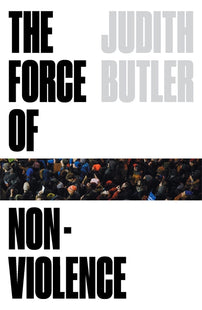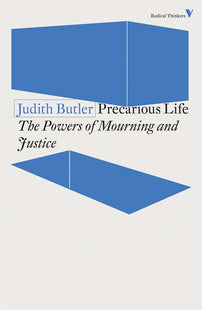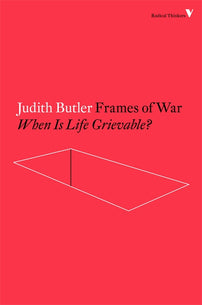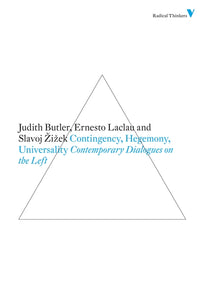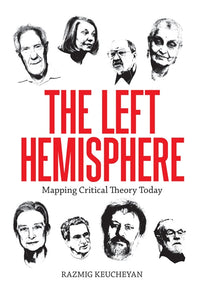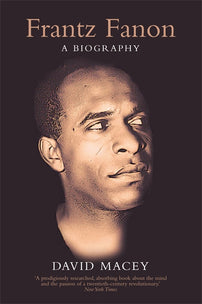A philosophy of nonviolence: Judith Butler interviewed by Alex Doherty
Judith Butler speaks to Alex Doherty about her new book, The Force of Nonviolence.

This interview firstly appeared on Politics Theory Other (https://soundcloud.com/
Alex Doherty: I imagine that a lot of people picking up the cover of a book called The Force of Nonviolence, with a picture of demonstrators on the front published by a well-known left-wing publisher, might think that they would find themselves reading perhaps a fairly practical book on the strategy and tactics of non-violence. But although the book does talk about some well-known practitioners of nonviolence, it is clear that the book is doing something quite different. Could you explain what your primary aim was in writing the book?
Judith Butler: I am trying to offer something like a philosophy of nonviolence. By that I mean not so much a set of prescriptions or even absolute principles but an ethos. I think my aim in this book is to think about nonviolence as a shared or common way of life and to pro- pose nonviolence as a social philosophy and also as an ethic. Although I am very interested in tactics and strategies — and I do remark upon them throughout the book — I think there are ways of thinking about nonviolence that compel us to rethink who we are as social creatures in the world, what our relationships are to one another, and what our relationship to the earth is in all that sustains and supports us. It is not a book that is full of prescriptions or absolute principles. But it does seek to develop a political ethos that is informed by ethical commitments.
AD: You take up the notion of self-defence in order to question what it is exactly that we mean by the self and the notion of the individual. That leads you to discussing the state of nature, this concept of a pre-state, prehistory, where humanity is conceived as a mass of warring individuals, at least in the way the idea was put forward by Thomas Hobbes. You point out that the idea of the individual in the state of nature depends upon disavowing and obscuring the way any supposed individual exists in a web of dependency. Could you talk more specifically about what the idea of the individual hides and how that is relevant to the question of nonviolence?
JB: There are two issues here relating to the individual self who can legitimately claim self-defence as a legal rationale for committing violence. In the first instance, I am indebted to the French philosopher Elsa Dorlin, whose book on self-defence will appear for Verso next year. She points out that, historically speaking, if you read the history of classical liberal political thought, you will see that only certain kindsof selves can invoke self-defence because they have a self to be defended and they are considered to have a self that is worthwhile or that is in fact socially recognizable as a self-worth-defending. Other selves are not really regarded as selves. They are called groups or populations or something else, but they are not individuated according to certain norms of individuality.
There is a second point, of course, that feminist philosophers and political theorists have been arguing for some time. It refers to the self-interested individual that we find at the heart of a great deal (although not all) of the classical liberal political thought. It is presumably masculine and autonomous in a way that does not admit to the fundamental relations of dependency that constitute every individual. I think that dependency is important for a number of reasons. Although the reason that is perhaps most important for this book is that dependency foregrounds social bonds that we have. Sometimes we acknowledge them and sometimes we do not, but we are fundamentally interdependent upon one another. It is interesting that Martin Luther King Jr also based his philosophy practice of nonviolence on a concept of interdependency.
[book-strip index="1" style="display"]AD: One of the things you specifically mentioned in the book that is hidden in the idea of the sovereign individual in the state of nature is the following: Not only is the individual conceived of as a male and heterosexual, but also as an adult. Could you talk about the importance of that?
JB: I think that is terribly important and, of course, one can look at that psychoanalytically. But one could also think back to the early Marx who foregrounds the entire problem of subsistence: how is it that any of us do achieve some measure of individuation, as the psychologists would say? How do we become individuals? No one is born an individual, to rephrase Simone de Beauvoir. We become one to some degree. Although I am not sure anyone truly becomes an individual in the sense that they are demarcated from other people. I think that we depend on others for our material subsistence, our ability to be sustained in life and that is true about food, it is true about shelter, and it is true about all the basic requirements of human life. They depend on social relations and institutions and infrastructures that make our lives possible. So, we could disavow them and imagine that as individuals we are somehow fully self-sufficient, or we make our own way, or we are fully responsible for the material conditions of our lives. But I think that it is a fantasy and it is in fact a dangerous fantasy because it disavows all the social relations on which we depend, and which form some substantial part of who we are.
There is a claim that I am making which is that only through imagining ourselves as social anrelational beings can we come to understand the importance of non-violence as a practice. It is not just a question of what I, this individual, might do to someone else who gets in my way. It is a question of how I conceive of this self as already bound to others. What is it I destroy when I do violent harm to another individual? Well, I destroy the social bond that links us and that could be disavowed. It can be structured along hierarchical and exploitative means. I do not mean to say that it is always beautiful. It is not. But I think we should be struggling for radically egalitarian social relations and my sense is that nonviolence is part of that struggle. We do not understand equality well if we do not understand its relation to interdependency to the way that violence is unequally distributed across populations.
AD: Would you understand that process of individuation as inevitable? Although we experience a certain kind of individuation in the current context of capitalist social relations, there will always be individuation and we cannot imagine a situation where we do not go through that process. So, the threat of violence is always there because there is always a basis for it, because of this fantasy that we are sovereign individuals.
JB: I think I agree with your addition. I would say that there are different notions of individuation depending on whom we are talking about and where we are. A lot depends on gender and race and historical context and there are certain cultural zones where individuation is highly prized. Especially when it is functioning in the service of a capitalist ethic or neoliberal notions of self-maximization or entrepreneurial selfhood. It could very well be that those same notions of individuation do not take hold in black and brown communities at least in the United States in the exact same way that they would in white communities. They do not always take hold in the same way for women as for men. It depends on how much you conceive of your very self as bound up with the relations that sustain you or the relations that define you in some way, and that varies depending on historical and cultural context. I would say that where this notion of individual sovereignty reigns, which is a kind of fantasy, it is based on a disavowal of fundamental dependency not just a disavowal of childhood but of a continuing dependency that none of us can fully overcome. Part of the violent destructive potential in all relations has to do at least in part with needing to individuate and not wanting to individuate. Violence can come from both of those tendencies if left to expand into their extreme versions.
AD: In the book you mentioned Lacan’s notion of the mirror stage. He talks about an infant in front of the mirror who sees a very sort of integrated sovereign individual capable of doing things, and conceives of itself as being identical with that image in the mirror, rather than the much more complicated, and, as you are arguing, a much more dependent entity. There is that kind of non-alignment between what we often perceive as our individual character and the much more porous and complicated nature of ourselves. Do you think there is always a degree of anger within that process? That we want to be more individual than we actually are?
JB: I am not a Lacanian. I am probably more of a Freudian and I follow perhaps most closely a kind of relational psychoanalytic point of view that has emerged from Freudian thought and maybe the present version of object relations to some degree. But I am also interested in the death drive which brings me a little closer to the Kleinians. The reason to reference Lacan though is precisely because the young child, which is presumed to be a boy and marked as such in French, is jubilant at the reflection in the mirror precisely because he imagines that he is all powerful, that he is standing on his own and he is reflected back to himself as standing on his own. Yet he is supported from the back. Lacan refers to that support as a trotte-bébé which means a kind of support for the baby, something that is a stand or a platform. In fact it is a mother or a caretaker who is holding him. The fact of that basic dependency in order to stand on one’s own is disavowed and renamed in the course of Lacan’s otherwise quite incisive description. But even he, by not allowing whoever is helping to be named as such, is also participating in this illusion of a fundamental independency. I think that is important to point out because when we start social or ethical analysis with individualism, with methodological individuals, and we start with: I am an individual. I have to contemplate. Do I do violence? Do I? Do I not? Give me a hypothosis and let us see how my principles stand up in the face of a particular hypothetical challenge. I have started with this “I” who is imagining a situation. But how did this “I” come into being?
We act as if that question is not germane to the question of whether or not to act violently. But I think it is because we never truly overcome dependency. We live in the world as adults in social interdependence and we either have political ways of organising that interdependence that moves in the direction of equality, or we have that move in the direction of inequality even radical inequality. That is where it seems to me we are faced with a different kind of question. A different kind of problem, and a different framework for thinking about nonviolence. If you are contemplating doing violence but you do not recognize the other person as a human person or as a human life or as a life that has value, then you may not recognize your own act of violence as violence at all. In other words, when we are talking about the bombing or the targeting of populations who are considered less human or who are considered “ungrievable”, that is to say, their lives are not considered to be valuable human lives. They would not be grieved if they were lost. Is that an act of violence? Or were those people always in some sense gone, or not existing, or not part of the living, such that whatever is done to them is a kind of redundancy? They do not actually suffer because they are not conceived as conscientious and suffering creatures.
[book-strip index="2" style="display"]AD: Or if they are conceived in that way, they are conceived as a threat.
JD: Which is also to transform them into vessels of violence or as symbolic instantiations of violence that have to be extinguished in order to extinguish violence. But of course, that commits a rather transparent but very popular form of externalizing one’s own aggression. I must kill those who are the true killers.
AD: It is hard to find any form of violence that is not justified in terms of self-defence at some level.
JD: I think we need to think critically about self-defence if we are defending a nation as white and defending a nation against racial or ethnic heterogeneity. Is that self-defence? Many people who are right-wing racists would say, yes.
AD: You have already mentioned that you do not see nonviolence as some kind of absolute principle applicable in all situations. So maybe it is not possible to draw a line. But if you were to draw a line between violence and self-defence where would you try to draw it?
JB: My effort in this book is to try to shift the debate on nonviolence from an exclusively moral framework to a social and political one that is informed by ethics. The question of what you would do as an individual in this situation returns me to the moral framework. Of course, sometimes we function precisely in that way and ask: what do I do?
My answer is twofold: On the one hand, I would say that there are enormously forceful and aggressive forms of nonviolence that can be used to oppose state violence and police violence. It can be used to sort or undermine the capacities of violent institutions or violent individuals. I am in favour of that. I do not understand nonviolence as passive. I do not understand it as peaceable. I do not believe it emerges from some internal place of equanimity. Nonviolence can be raging and in fact it might be defined as a way of cultivating or redirecting rage in such a way that it does not reproduce the violence it opposes. The question I would ask in any given instance is the following: is my action reproducing the violence that it opposes? If it reproduces the violence it opposes it is adding more of that violence to the world and that cannot be a good solution. It is actually a contradictory solution.
AD: Let us take a concrete case. You talked about the circulation of violence. That evokes liberal tropes around cycles of violence which we particularly see with regard to the Israel-Palestine conflict, for example. But if we take a particularly extreme case, if we think about the Warsaw Ghetto Uprising, and the violence of the fighters in the Warsaw Ghetto attempting to assault and attack and kill German forces. Presumably you would not include that as a category of a violence that reproduces violence.
JB: I would not include it, but let us think about that example because there were people involved in various aspects of the Warsaw Ghetto Uprising. Let us also remember that uprisings involved networks and communications, which sutured communities both inside and outside the ghetto. There was a lot going on there besides the smuggling in of rifles, the making of rifles, and the violent uprising. I would say that when we talk about uprising it is not necessarily violent uprising. There can be final violent dimensions of uprising but not all uprising is violent. This strikes me as extremely important. There are not nonviolent dimensions of the Warsaw Uprising, as well as nonviolent and this is well documented at least in the materials that I saw in Poland when I visited there a few years ago.
AD: I suppose it also exposes the fact that care work, for example, would be involved in an uprising.
JB: That is also true. I mean that is true in every uprising. There is always the reproduction of labour to keep rising up over time. People have to move in and out. Dismantling a violent regime like the Nazi-Regime certainly takes enormous force and even violence to do that. I understand that. But there is a question and it emerged of course for people in the immediate aftermath of that uprising and indeed in the immediate aftermath of World War II. It is the lesson of the Warsaw Uprising that we must now live with a very strong military for the Jewish people or for all of the people who were there: communists to dissenters, homosexuals. In other words, does the Warsaw Uprising now make a case for a militarized state like the State of Israel? Does it make the case for the Jewish Army? How far do we take that? What does it mean to be engaged in a in a violent dismantling of a structure violence that does not take violence as a way of life and develops a notion of national self-defence which involves intensified militarization? We need to stop at that moment and think a little bit more about what that uprising tells us about what is justifiable in the long run and what is not.
I am not a purist. I am really not. But I am concerned that when we agree to violent tactics and strategies as a mean to achieve a certain kind of end and we imagined that the violence will fall away, once we have achieved that end. We forget that we have produced a defence for violence that can be used in other contexts, and that we have also unleashed more violence into the world. I would say that a violent up- rising against a fascist regime also needs to have a plan for reparation and for the restoration of nonviolence as a mode of life. If it does not have that we can see what the terrible consequences are.
AD: Somewhere in the book you have this great phrase about the othering of populations who have been marked down as legitimate targets of violence. You say that even perhaps people on the Left who would justify certain forms of revolutionary violence or insurrectionary violence that sometimes they may be (and correct me if I am misquoting you) “communitarians without knowing it”. It seems very much the case if we are talking about a particular nation or a particular ethnic group. But it made me wonder about the question of class and subjecting part of the state apparatus of the bourgeoisie to violence. Because in that case proponents of revolutionary violence would say that although we will use violence to achieve a specific end, we are not marking down the bourgeoisie for destruction as individuals or as living people, but rather as a class. What we ask of them is to cease their continued participation in their repressive role, which is obviously quite different to the idea of marking down entire populations for destruction.
JB: I think there are two different issues here. It reminds me of Albert Camus’ play The Just. The argument made there is “we are going to kill somebody but not as a living individual but rather as a representative of a class”. I mean, it was an act of murder but there was all this political rationality layered on top of that brute fact.
AD: It is not going to make the victim feel particularly better about it!
JB: Yes, nor it makes the executioner feel better, when living with the aftermath of the act. I do not believe any person is fully exhausted by their class position or that we can target individuals as representatives of a class and nothing else. I think that is a totalising form of categorisation and that it serves certain purposes. I know for sure that for the debates on violent resistance, it is really important to revisit Camus, Merleau-Ponty, Sartre, and Fanon. This categorisation is at the core of their disagreements on the Algerian War.
I think the argument about communitarianism enters a little bit differently. I think that comes up when we belong to a community and we practice the same religion, or we speak the same language, or we have some sense of dominant racial belonging, and we want to preserve that over and against those who are perceived as threatening who we are. That is a narrow communitarian notion of a social bond. I am against that. Which is why part of the argument of this book is to say that a substantial and coherent approach to nonviolence requires a theory of and commitment to radical social equality. That would be precisely not to be constrained by communitarian identifications of that kind. Whether their nation, race, religion, ethnicity or whatever.
AD: Would you understand calls to nonviolence that are not coupled with calls for radical equality as effectively justifications for the status quo, and calling on subaltern populations to a kind of political quietism?
JB: I think it is a kind of quietism, but it also allows certain kinds of assumptions to stay in place, some of which we have spoken about. Who has a self that is considered worthy to be defended? And whose lives are not considered to be grievable? Whose life could be lost with no loss having taken place? Or perceived that way?
What the US military assault on Iraq did many years ago was precisely to leave that country with enormously toxic soil that made the liveability of that environment impossible for a number of living creatures, humans and others. Do we think of that as an ongoing act of violence the toxicity of the soil? I think we do. We are not able to understand that, unless we see that the US afflicts others what it would never tolerate if others were to inflict the same on us. That is precisely because of an imperialist and cultural supremacy. A presumption of supremacy that is being enacted through that kind of warfare and its aftermath. Similarly, the failure to provide support for those who are seeking to cross the Mediterranean to leave violent or economically destitute situations is itself a form of violence. It can take place without being called violent precisely because the lives that are dumped into that sea or forced to return are not considered to be grievable lives. Those policies are formulated with a presumption of radical social inequality so we cannot even name violence properly. We cannot name nonviolence properly unless we understand where and how those terms are used and abused in the service of furthering social inequality of various kinds.
AD: On the notion of grievability, you talk about how people are interpolated as grievable and non-grievable people, which is quite a devastating thought. I am a white male and I have been interpolated as someone who is worth grieving at some level. There are populations who are not interpolated in that way, and we can obviously think of something like Black Lives Matter as a movement which seeks to assert the grievability of a population which is denied.
JB: I think it is denied by certain powers. It is denied in certain media. It is denied in certain parts of society. Generally, the most powerful ones, but in black and brown communities in the US people are grieving those lives and they are treating each other as lives worth living. It is not a totalising picture. Black Lives Matter raises the question of whose life counts as a life? When we say that somebody’s life counts as a life, we are saying it matters, it appears as a life that is treasured and valued as a life. It is mourned as a life and it is kept from harm. It is kept from death precisely because we all wish life to persist and flourish. But who lives with that presumption? I think fewer and fewer people. I think racial distinctions are huge here, but it is not just race. It is also about a number of people across racial divisions that are increasingly precarious and destitute.
You can be a very poor white man and feel like your life is radically unbreathable, and that no one is looking out for that life, and that no one cares whether you live or die. The policies that are being adopted at the highest level, and are being accepted by the popular media, leave you in a state of destitution, with no real sense of futurity. People with debts are living with a sense of time which should not be the time of a human life. It should not be this sense of no future, or a future that is bound, or yoked to a bank, or to a federal authority that is going to exact impossible payments from you for the rest of life until death. Those are all forms of treating lives as unbreathable which is simply to say not equally valuable, not mattering on equal terms.
[book-strip index="3" style="display"]